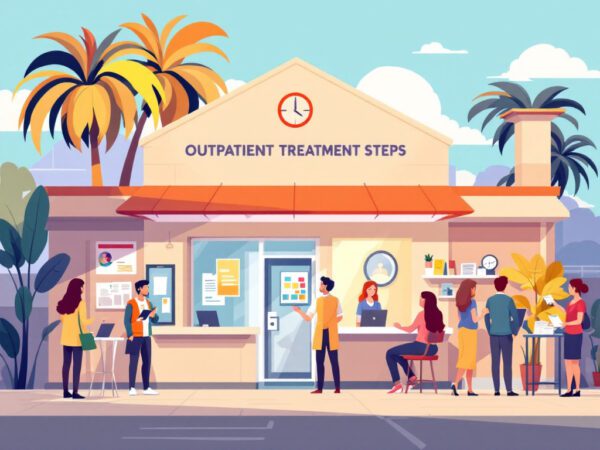Why Choose Totality Treatment
Totality Treatment’s Approach
At Totality Treatment, we utilize a holistic and structured approach to addiction recovery. Our programs incorporate a variety of therapeutic modalities that are tailored to meet the unique needs of each individual. Among these, EMDR trauma therapy plays a critical role in addressing underlying trauma that often contributes to substance abuse.
Our dedicated team of professionals understands the complexities of addiction, and we emphasize the importance of integrating therapies like EMDR with other evidence-based treatments such as cognitive behavioral therapy, dialectical behavior therapy, and mindfulness-based therapy. This comprehensive approach allows us to address both the symptoms of addiction and the root causes, enabling lasting change.
Understanding EMDR Therapy
EMDR (Eye Movement Desensitization and Reprocessing) therapy is an innovative and effective approach for individuals healing from trauma. As we explore this therapy, it’s crucial to understand its benefits and the associated risks and considerations.
Benefits of EMDR Therapy
EMDR therapy has been shown to lead to significant symptom reduction in as few as eight sessions, often outpacing traditional talk therapies. It was first clinically investigated back in 1989, and since then, many clinical trials have demonstrated its effectiveness in helping individuals recover from trauma more rapidly than other methods Cleveland Clinic.
Some notable benefits include:
| Benefit | Description |
|---|---|
| Rapid Healing | Many patients experience significant improvement quickly, sometimes within three to six sessions for a single event. More complex traumas may take 8-12 sessions or more. |
| Versatility | EMDR is effective not only for PTSD but also for anxiety disorders, specific phobias, developmental trauma, addictions, eating disorders, performance anxiety, sleep issues, and OCD Embark. |
| Structured Framework | The therapy consists of eight phases that guide patients through the healing process, helping to manage and process distressing memories. |
Risks and Considerations
While EMDR therapy has very low risks, it is essential to consider potential challenges. The most common negative effects may include experiencing distressing thoughts or feelings between sessions Cleveland Clinic. Healthcare providers are well-equipped to help patients navigate these feelings and provide guidance on what to expect.
Key considerations include:
| Risk Factor | Description |
|---|---|
| Emotional Distress | Patients may confront uncomfortable emotions or memories during or after sessions. |
| Therapist Support | Working with a certified and experienced therapist is crucial to ensure a safe environment and effective coping strategies. |
| Individual Variability | The duration and intensity of therapy sessions may vary based on the individual’s specific trauma history and responses to treatment. |
EMDR therapy stands among the many treatment methodologies available, including cognitive behavioral therapy, dialectical behavior therapy, and mindfulness-based therapy. As we consider treatment options for ourselves or our loved ones, it is essential to understand the comprehensive benefits and be prepared for potential challenges.
EMDR in Trauma Treatment
Trauma Therapy Overview
Trauma therapy is essential for individuals coping with distressing experiences. The primary goal of trauma therapy is to help clients process traumatic events, address emotions surrounding these experiences, and develop coping strategies to navigate day-to-day life. Effective trauma therapy can make a significant difference in reducing fear and avoidance behaviors that stem from trauma (Verywell Mind).
We utilize EMDR trauma therapy as a structured approach to facilitate healing. EMDR, or Eye Movement Desensitization and Reprocessing, helps individuals change how they think, feel, and behave regarding upsetting situations. Through planned dialogue and guidance, the therapist and client work together to identify the root causes of the distress and to develop coping mechanisms (Positive Psychology).
| Key Benefits of Trauma Therapy | Description |
|---|---|
| Processes traumatic memories | Helps clients confront and process memories associated with trauma. |
| Improves coping skills | Teaches clients better strategies for handling triggers and stressors. |
| Reduces avoidance behaviors | Encourages engagement with emotions rather than avoidance. |
| Validates experiences | Offers reassurance and understanding to clients’ stories. |
Addressing Complex Trauma
Complex trauma, often originating from prolonged exposure to distressing events, can have far-reaching effects on an individual’s emotional and psychological well-being. EMDR is particularly beneficial for addressing complex trauma as it focuses on both the traumatic memories and the accompanying feelings that may affect one’s self-perception and relationships (Verywell Mind).
Using EMDR therapy, we provide a safe environment for clients to revisit difficult experiences while equipping them with tools to process these emotions. This structured approach encourages individuals to rebuild trust in themselves and others, challenge negative beliefs, and redefine their personal narratives.
EMDR has been recognized as a “best practice” for treating trauma, including PTSD, by reputable organizations, including the Department of Veterans Affairs and the World Health Organization. By incorporating EMDR into our trauma treatment programs, we address the complexities of trauma through personalized therapy, allowing individuals to reclaim their lives and foster resilience.
For additional support processes, we offer complementary therapies, such as cognitive behavioral therapy and mindfulness-based therapy, to enhance overall treatment outcomes.
Importance of Certified Therapists
When considering EMDR trauma therapy for ourselves or a loved one, the competence of the therapist plays a critical role in the treatment outcome. Choosing professionals who are certified in EMDR can significantly enhance the effectiveness of therapy.
EMDR Certification
To practice EMDR therapy, therapists must receive specific certification that ensures they are adequately trained in this therapeutic approach. Over 60,000 therapists are certified in EMDR therapy, emphasizing the importance of working with a qualified professional to avoid potential harm or ineffective treatment (Emotions Therapy Calgary). EMDRI certification ensures that therapists have undergone extensive training, completed multiple hours of consultations and clinical EMDR sessions, and maintained their certification through continuous education.
Understanding the certification process is vital for everyone seeking trauma therapy. Certified therapists are well-equipped with strategies and techniques necessary to address various traumas effectively, ensuring a comprehensive and safe healing experience.
Therapeutic Alliance in EMDR
The therapeutic alliance—the relationship between therapist and client—is crucial in EMDR therapy. When goals between the therapist and the individual align, it can significantly improve treatment outcomes (Embark). A strong therapeutic alliance fosters trust, open communication, and collaboration, which are essential elements for the success of EMDR.
Working with a therapist who understands the effects of discrimination and can address complex issues such as racism, cultural concerns, and historical trauma is particularly important for individuals from minoritized backgrounds, including BIPOC. This understanding enhances the therapeutic process and helps clients feel seen, heard, and supported throughout their healing journey.
At Totality Treatment, we prioritize employing certified therapists who are committed to helping clients navigate their trauma in a safe and effective environment. For more information on various therapeutic techniques we offer, please explore our resources on cognitive behavioral therapy and individual therapy.
EMDR for Various Conditions
EMDR trauma therapy is increasingly recognized for its versatility. While it is well-known for being effective in treating PTSD, we can also find significant benefits in treating other mental health conditions, including anxiety and OCD.
EMDR Beyond PTSD
EMDR therapy extends its effectiveness beyond PTSD. Research has shown that it can be beneficial for a wide range of conditions such as anxiety disorders, specific phobias, developmental and childhood trauma, addictions, eating disorders, performance anxiety, sleep issues, and obsessive-compulsive disorder (OCD) (Embark). The approach involves a methodical eight-phase process aimed at helping individuals reprocess traumatic memories and reduce their associated negative impacts.
| Condition | EMDR Effectiveness |
|---|---|
| PTSD | High |
| Anxiety Disorders | High |
| Specific Phobias | Moderate to High |
| Addictions | Moderate |
| Obsessive-Compulsive Disorder | High |
This therapy allows individuals to confront distressing memories in a supportive environment, promoting healing. We encourage exploring how EMDR can address various mental health issues, as it offers hope for many who may have suffered in silence.
EMDR for Anxiety and OCD
Regarding anxiety and OCD, EMDR therapy has shown considerable promise. The structured approach helps to desensitize anxious individuals to triggering memories and stimuli. With a focus on reprocessing distressing thoughts, EMDR can alleviate symptoms associated with anxiety disorders and OCD.
Studies indicate that trauma-informed therapies, including EMDR, can effectively treat these conditions. They often include Cognitive Behavioral Therapy (CBT) and other cognizant methods, which are also beneficial for managing depression and anxiety. The gradual and systematic approach of EMDR can empower individuals to confront their fears and anxieties, leading to improved mental health outcomes.
Combining EMDR with other therapeutic techniques, such as group therapy addiction or individual therapy, can enrich the treatment process. This holistic approach allows for addressing the underlying issues contributing to anxiety and OCD, paving the way for a more comprehensive recovery.
Overall, EMDR trauma therapy serves as a valuable treatment option for a variety of conditions, and we strongly advocate for its use in our healing journeys.
EMDR: Research and Effectiveness
Clinical Evidence on EMDR
EMDR (Eye Movement Desensitization and Reprocessing) therapy has been extensively researched since its introduction in 1989. Numerous clinical trials demonstrate its effectiveness in assisting individuals to heal from trauma more quickly than many traditional methods. EMDR is often recognized for its ability to help people recover from post-traumatic stress disorder (PTSD), but its application extends to various other conditions (Cleveland Clinic).
The following table illustrates key clinical findings regarding EMDR therapy:
| Study Focus | Findings |
|---|---|
| PTSD Treatment | EMDR therapy significantly reduces PTSD symptoms in adults and children. |
| Longevity of Results | Trauma management studies show veterans retain symptom reduction even six months post-treatment (Verywell Mind). |
| Expanded Use | Evidence indicates EMDR’s effectiveness in treating a broader range of issues beyond PTSD, including anxiety and depression (Cleveland Clinic). |
| Endorsement | EMDR is recognized as a “best practice” for treating veterans by the Department of Veterans Affairs and is endorsed by the World Health Organization (Cleveland Clinic). |
These findings affirm the growing recognition of EMDR as a vital therapeutic approach for various traumatic experiences, reinforcing our advocacy for its inclusion in treatment programs at Totality Treatment.















